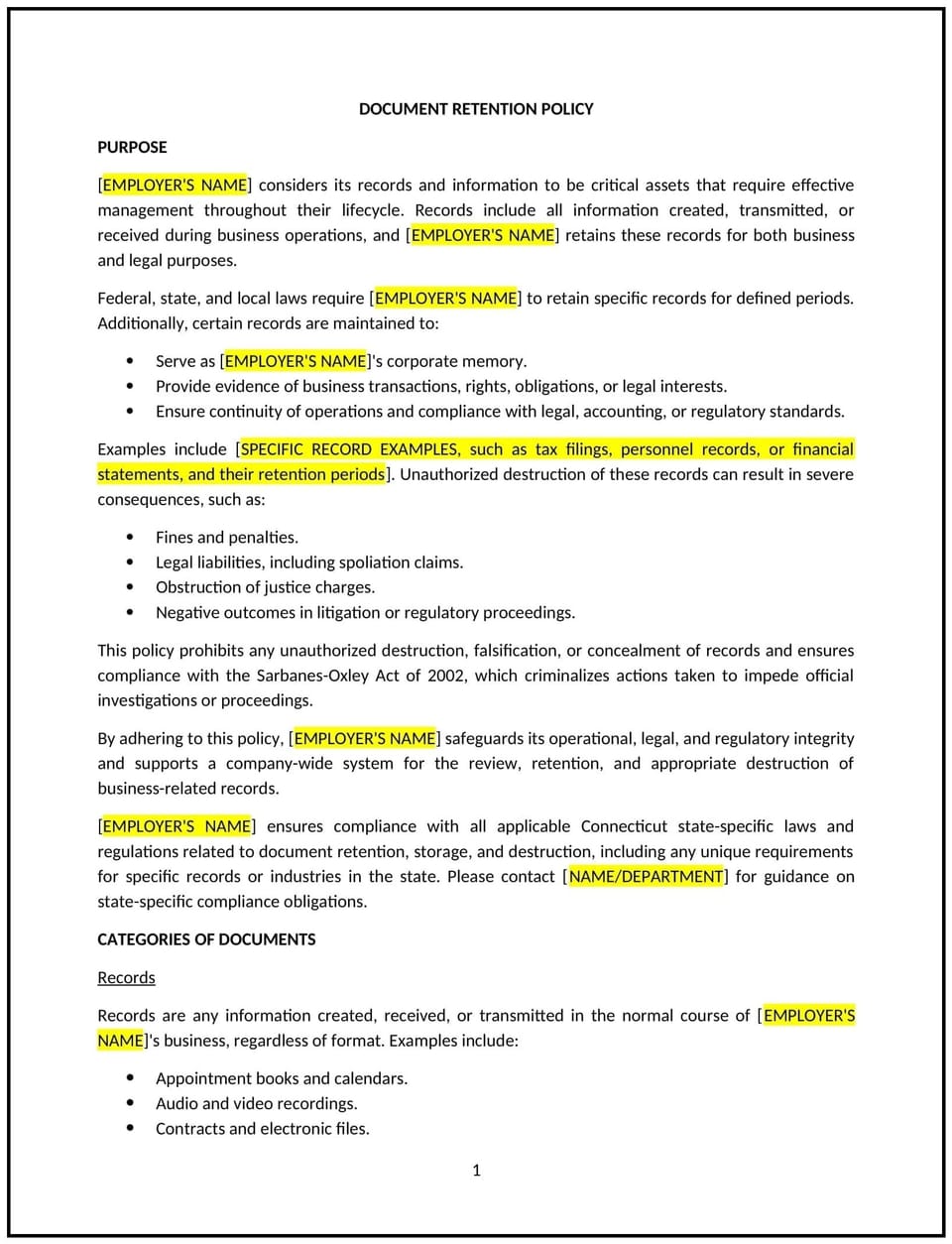Document retention policy (Connecticut): Free template

Document retention policy (Connecticut)
A document retention policy helps Connecticut businesses establish clear guidelines for managing, storing, and disposing of business documents. This policy outlines the types of documents that need to be retained, the duration for which they should be kept, and the proper procedures for destroying outdated or unnecessary documents, ensuring compliance with legal, regulatory, and business requirements.
By implementing this policy, businesses can protect important information, ensure efficient document management, and reduce the risk of non-compliance with data retention laws.
How to use this document retention policy (Connecticut)
- Define document types: Specify which documents need to be retained, such as contracts, financial records, employee files, tax records, and legal documents.
- Set retention periods: Establish clear retention periods for each type of document based on legal, regulatory, and business needs. For example, tax records may need to be kept for seven years, while employment records might need to be retained for a specific period after employment ends.
- Implement secure storage: Outline the procedures for storing documents securely, whether in physical or electronic form, and ensure that sensitive information is protected from unauthorized access.
- Specify destruction procedures: Clearly define the process for disposing of documents once they are no longer needed, including secure shredding of paper documents and proper deletion of electronic files.
- Monitor compliance: Regularly review and audit document retention practices to ensure compliance with the policy and relevant regulations.
Benefits of using this document retention policy (Connecticut)
This policy offers several benefits for Connecticut businesses:
- Supports legal compliance: Helps businesses comply with federal and state laws regarding document retention, such as tax and employment record requirements.
- Reduces liability: Reduces the risk of storing outdated or unnecessary documents that could be used in legal disputes or compliance investigations.
- Promotes operational efficiency: Helps businesses organize and manage documents more effectively, reducing clutter and improving access to important files.
- Protects sensitive information: Ensures that sensitive documents are securely stored and properly destroyed to prevent unauthorized access or data breaches.
- Enhances data governance: Establishes a clear and consistent framework for managing business records, contributing to better data governance practices.
Tips for using this document retention policy (Connecticut)
- Communicate the policy clearly: Ensure all employees are aware of the document retention policy and understand their responsibilities regarding document storage, retention, and disposal.
- Use digital tools: Consider implementing document management software to help store and manage electronic documents securely, streamline the retention process, and automate destruction schedules.
- Review regularly: Periodically review the retention periods for documents to ensure compliance with any changes in laws or business needs.
- Train employees: Provide training on how to handle sensitive documents and how to follow the policy for storing and disposing of records properly.
- Maintain proper documentation: Keep detailed records of document disposal and retention activities to demonstrate compliance during audits or legal investigations.
Q: How does this policy benefit my business?
A: The policy helps businesses comply with legal requirements, reduce the risk of storing unnecessary or outdated documents, and improve document management practices for better operational efficiency.
Q: What types of documents need to be retained?
A: The policy should outline which documents need to be retained, including contracts, tax records, financial statements, employee records, and other business-critical documents. These should be retained according to the legal requirements and business needs.
Q: How long should certain documents be kept?
A: Retention periods vary depending on the type of document. For example, tax records may need to be kept for seven years, while certain employment records might need to be kept for several years after an employee leaves the company. The policy should set specific retention periods for each type of document.
Q: What should be done with documents once they are no longer needed?
A: Once documents have reached the end of their retention period, they should be securely destroyed, either by shredding physical documents or permanently deleting electronic files, following the procedures outlined in the policy.
Q: How often should this policy be reviewed?
A: The policy should be reviewed annually or whenever there are updates to Connecticut laws or federal regulations regarding document retention, or changes in business practices, to ensure it remains effective and compliant.
This article contains general legal information and does not contain legal advice. Cobrief is not a law firm or a substitute for an attorney or law firm. The law is complex and changes often. For legal advice, please ask a lawyer.


